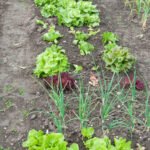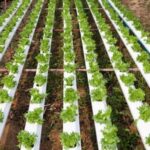Pig manure is a common organic fertilizer used in vegetable gardens to enhance soil fertility and promote plant growth. Many gardeners are drawn to using pig manure due to its rich nutrient content and ability to improve soil structure. However, the question of whether pig manure is safe for vegetable gardens is an important one to address. In this article, we will explore the benefits, risks, and best practices associated with using pig manure in vegetable gardens.
Pig manure, also known as hog or swine manure, is a valuable source of organic matter that provides essential nutrients for plant growth. In vegetable gardening, where soil quality plays a crucial role in crop production, incorporating organic matter like pig manure can significantly benefit the overall health of the garden. By understanding the composition of pig manure and how it affects soil structure, gardeners can make informed decisions about its use in their gardens.
When considering the use of pig manure in vegetable gardens, it’s essential to be aware of potential contaminants that may be present in the manure. While pig manure contains valuable nutrients such as nitrogen, phosphorus, and potassium, it can also harbor pathogens that could pose risks to human health and plant development. By understanding both the benefits and risks associated with pig manure, gardeners can take necessary precautions to ensure the safety of their crops and themselves.
Composition of Pig Manure
Nutrients in Pig Manure
Pig manure is a nutrient-rich organic material that can greatly benefit vegetable gardens when used properly. It contains essential nutrients such as nitrogen, phosphorus, and potassium, which are vital for plant growth and development. These nutrients help improve soil fertility and support healthy plant growth, resulting in higher yields of fruits and vegetables. Farmers and gardeners often use pig manure as a natural fertilizer to promote robust plant growth and improve overall soil health.
Potential Contaminants to Be Aware Of
While pig manure is beneficial for vegetable gardens, it is important to be aware of potential contaminants that may be present in the manure. Due to the nature of pig farming practices, pig manure can sometimes contain harmful pathogens such as E. coli or salmonella.
These pathogens can pose risks to human health if vegetables grown in contaminated soil are not properly washed or cooked before consumption. Additionally, antibiotics or chemical residues from pig feed may also be present in the manure, which could impact the quality of the produce grown in the garden.
Considering Safety When Using Pig Manure
Before using pig manure in vegetable gardens, it is crucial to take safety precautions to minimize potential risks. Composting the pig manure before application can help reduce the presence of harmful pathogens and break down any unwanted chemicals in the manure. Proper application techniques, such as mixing the composted manure with soil or other organic matter, can ensure even distribution of nutrients while minimizing odor issues.
Monitoring soil health after applying pig manure is essential to track plant responses and address any concerns promptly. By following these best practices, gardeners can safely utilize pig manure as a natural fertilizer for their vegetable gardens while maximizing its benefits.
Benefits of Using Pig Manure in Vegetable Gardens
Using pig manure as a natural fertilizer in vegetable gardens offers several benefits that can contribute to healthier plants and higher yields. Here are some key advantages of incorporating pig manure into your gardening practices:
- Improves soil structure: Pig manure is rich in organic matter, which helps improve soil texture and aeration. This can result in better root growth and water infiltration, allowing plants to access nutrients more easily.
- Provides essential nutrients for plant growth: Pig manure is a good source of essential nutrients such as nitrogen, phosphorus, and potassium, which are crucial for plant growth and development. These nutrients can help support overall plant health and productivity.
- Helps retain moisture in the soil: The organic matter in pig manure helps the soil retain moisture, reducing the need for frequent watering. This can be particularly beneficial during dry periods or in regions with limited water resources.
Despite these benefits, it is important to be aware of potential risks and concerns associated with using pig manure in vegetable gardens. By understanding how to mitigate these risks, you can safely harness the advantages of this natural fertilizer for your garden.
Risks and Concerns Associated With Pig Manure
Pig manure is a valuable source of organic matter and nutrients for vegetable gardens, but there are certain risks and concerns that gardeners need to be aware of when using it. Understanding these potential issues is crucial to ensure the safety of your plants, yourself, and the environment.
Here are some key risks and concerns associated with using pig manure in vegetable gardens:
- Presence of pathogens: Pig manure may contain harmful bacteria, parasites, or viruses that can pose health risks to humans and contaminate produce. Proper handling and processing can help minimize this risk.
- Potential for odor issues: Fresh pig manure has a strong smell that can be unpleasant. Composting the manure before use can help reduce odor problems and make it more suitable for gardening.
- Risk of over-fertilization: Pig manure is rich in nutrients, so applying too much can lead to an imbalance in the soil and harm plant growth. It is important to follow recommended guidelines for application rates.
Despite these concerns, pig manure can still be a beneficial addition to your vegetable garden when used correctly. By being aware of the risks and taking appropriate precautions, you can harness the benefits of this natural fertilizer without compromising the health and well-being of your plants or yourself.
Best Practices for Using Pig Manure in Vegetable Gardens
When considering using pig manure in vegetable gardens, it is essential to follow best practices to ensure optimal plant growth and soil health. One of the first steps in utilizing pig manure is composting. Composting pig manure breaks down any pathogens present, reduces odor issues, and creates a nutrient-rich organic fertilizer perfect for vegetable plants. This process also helps prevent the risk of over-fertilization and allows for better absorption of nutrients by plants.
Proper application techniques are crucial when incorporating pig manure into vegetable gardens. It is recommended to mix composted pig manure into the soil well before planting to distribute nutrients evenly. Layering a thin amount of compost on top of the soil can also provide a slow-release of nutrients throughout the growing season. Additionally, monitoring soil health after applying pig manure is important to ensure that the plants are thriving and there are no signs of nutrient deficiencies or imbalances.
It is essential to handle pig manure safely in vegetable gardens. This includes wearing protective gear such as gloves and masks when handling composted manure, as well as washing hands thoroughly after any contact with the material. Proper storage and transportation guidelines should also be followed to prevent contamination and maintain the quality of the composted manure. By following these best practices, using pig manure can be a safe and effective way to enhance vegetable gardens naturally.
| Best Practices for Using Pig Manure | In Vegetable Gardens |
|---|---|
| Composting pig manure before use | Breaks down pathogens, reduces odor issues |
| Proper application techniques | Mix into soil before planting, layer thinly on top for slow release |
| Safety measures for handling | Wear protective gear, wash hands thoroughly after use |
Safety Measures for Handling Pig Manure
Pig manure is a valuable source of organic matter and nutrients for vegetable gardens, but it is important to handle it safely to avoid any potential health risks. When considering whether pig manure is safe for vegetable gardens, following proper safety measures is crucial to ensure the well-being of both the gardener and the plants.
Wearing Protective Gear
When handling pig manure, it is recommended to wear gloves, a mask, and sturdy boots to protect against potential pathogens and contaminants that may be present. Additionally, wearing long sleeves and pants can help prevent direct contact with the manure, reducing the risk of skin irritation or infection.
Washing Hands Thoroughly After Handling
After coming into contact with pig manure, whether during application or composting, it is essential to wash hands thoroughly with soap and water. This helps prevent the spread of harmful bacteria and minimizes the risk of illness. Proper hand hygiene should be practiced not only after handling pig manure but also before eating or touching your face.
Storage and Transportation Guidelines
Proper storage and transportation of pig manure are key considerations when using it in vegetable gardens. Keep the manure in a designated area away from food preparation areas and make sure it is securely covered to prevent contamination by pests or rainwater. When transporting pig manure from one location to another, use leak-proof containers or bags to minimize spills and exposure. By following these safety measures, gardeners can effectively utilize pig manure while minimizing potential health hazards.
Alternatives to Pig Manure for Vegetable Gardens
When considering alternatives to using pig manure in vegetable gardens, there are several options available for gardeners. While pig manure is a valuable source of nutrients and organic matter, some individuals may have concerns about its use due to potential contaminants and safety issues. In such cases, exploring alternative organic fertilizers can provide a suitable solution for maintaining a healthy and thriving garden.
One popular alternative to pig manure is compost, which can be made from a variety of organic materials such as kitchen scraps, yard waste, and other animal manures. Compost not only provides essential nutrients for plants but also helps improve soil structure and moisture retention. Additionally, composting is an effective way to reduce waste and promote sustainability in gardening practices.
Another option for vegetable gardeners looking to avoid the use of pig manure is the utilization of other animal manures such as cow or chicken manure. These types of manures also contain valuable nutrients that can benefit plant growth and soil health.
However, it is important to note that different types of animal manures may have varying nutrient levels and application requirements, so it is crucial to research and understand the specific needs of your crops before using them as fertilizer.
Conclusion
In conclusion, pig manure can be a valuable source of nutrients and organic matter for vegetable gardens. While it is important to be aware of potential risks and concerns associated with using pig manure, following best practices can help mitigate these issues. Composting the manure before use, applying it properly, and monitoring soil health are essential steps in ensuring its safe and effective use in gardens.
When considering whether pig manure is safe for vegetable gardens, it is crucial to weigh the benefits it provides such as improving soil structure, providing essential nutrients for plant growth, and helping retain moisture in the soil. However, gardeners should also be mindful of the risks such as the presence of pathogens, potential odor issues, and the risk of over-fertilization.
By taking safety measures when handling pig manure, such as wearing protective gear, washing hands thoroughly after use, and following proper storage and transportation guidelines, gardeners can protect themselves from any potential hazards.
Frequently Asked Questions
What Is the Best Manure for Vegetable Garden?
The best manure for a vegetable garden varies depending on the specific needs of the plants. Generally, well-rotted cow or horse manure is commonly used due to its balanced nutrient content and ability to improve soil structure.
What Do Farmers Do With Pig Manure?
Farmers often use pig manure as a valuable source of organic fertilizer for their crops. Pig manure is rich in nutrients like nitrogen, phosphorus, and potassium, making it beneficial for enhancing soil fertility and crop growth.
Is Pig Manure Better Than Cow Manure?
Whether pig manure is better than cow manure depends on the specific requirements of the soil and plants being grown. Pig manure tends to have higher nitrogen content compared to cow manure but may require proper composting to avoid issues like odors or pathogens. Ultimately, both types of manure can be beneficial when used properly in agricultural practices.

If you’re looking to get into vegetable gardening, or are just looking for some tips on how to make your current garden better, then you’ve come to the right place! My name is Ethel and I have been gardening for years. In this blog, I’m going to share with you some of my best tips on how to create a successful vegetable garden.





